倒装用法归纳
- 格式:pdf
- 大小:29.22 KB
- 文档页数:3
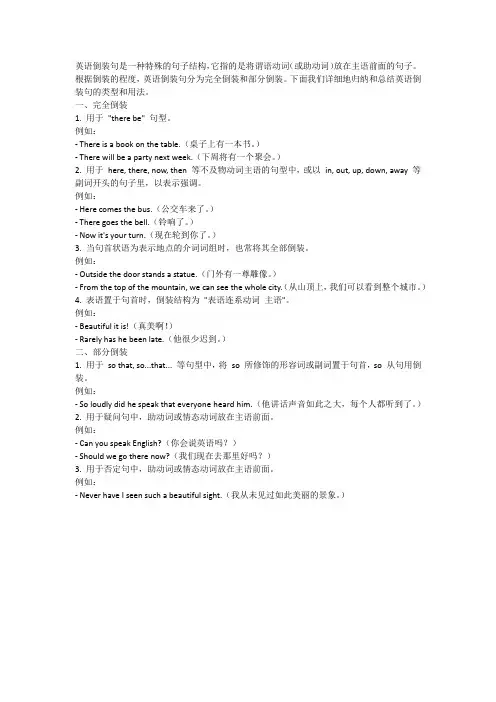
英语倒装句是一种特殊的句子结构,它指的是将谓语动词(或助动词)放在主语前面的句子。
根据倒装的程度,英语倒装句分为完全倒装和部分倒装。
下面我们详细地归纳和总结英语倒装句的类型和用法。
一、完全倒装1. 用于"there be" 句型。
例如:- There is a book on the table.(桌子上有一本书。
)- There will be a party next week.(下周将有一个聚会。
)2. 用于here, there, now, then 等不及物动词主语的句型中,或以in, out, up, down, away 等副词开头的句子里,以表示强调。
例如:- Here comes the bus.(公交车来了。
)- There goes the bell.(铃响了。
)- Now it's your turn.(现在轮到你了。
)3. 当句首状语为表示地点的介词词组时,也常将其全部倒装。
例如:- Outside the door stands a statue.(门外有一尊雕像。
)- From the top of the mountain, we can see the whole city.(从山顶上,我们可以看到整个城市。
)4. 表语置于句首时,倒装结构为"表语连系动词主语"。
例如:- Beautiful it is!(真美啊!)- Rarely has he been late.(他很少迟到。
)二、部分倒装1. 用于so that, so...that... 等句型中,将so 所修饰的形容词或副词置于句首,so 从句用倒装。
例如:- So loudly did he speak that everyone heard him.(他讲话声音如此之大,每个人都听到了。
)2. 用于疑问句中,助动词或情态动词放在主语前面。
例如:- Can you speak English?(你会说英语吗?)- Should we go there now?(我们现在去那里好吗?)3. 用于否定句中,助动词或情态动词放在主语前面。
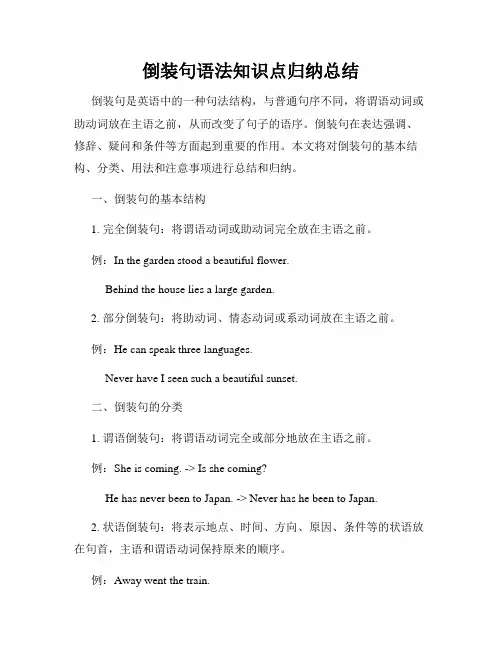
倒装句语法知识点归纳总结倒装句是英语中的一种句法结构,与普通句序不同,将谓语动词或助动词放在主语之前,从而改变了句子的语序。
倒装句在表达强调、修辞、疑问和条件等方面起到重要的作用。
本文将对倒装句的基本结构、分类、用法和注意事项进行总结和归纳。
一、倒装句的基本结构1. 完全倒装句:将谓语动词或助动词完全放在主语之前。
例:In the garden stood a beautiful flower.Behind the house lies a large garden.2. 部分倒装句:将助动词、情态动词或系动词放在主语之前。
例:He can speak three languages.Never have I seen such a beautiful sunset.二、倒装句的分类1. 谓语倒装句:将谓语动词完全或部分地放在主语之前。
例:She is coming. -> Is she coming?He has never been to Japan. -> Never has he been to Japan.2. 状语倒装句:将表示地点、时间、方向、原因、条件等的状语放在句首,主语和谓语动词保持原来的顺序。
例:Away went the train.In the distance could be seen a tall tower.3. 主从倒装句:主句和从句中的主语-谓语结构进行倒装。
例:Not until she finished her homework did she go to bed.Only when the rain stopped could we go outside.三、倒装句的用法1. 强调句:通过倒装句,可以将句子的某一部分进行强调,常用的结构是完全倒装句和部分倒装句。
例:Not only did he win the game, but he also broke the record.Under no circumstances should you touch the red button.2. 疑问句:直接将谓语动词或助动词放在主语之前形成疑问句。
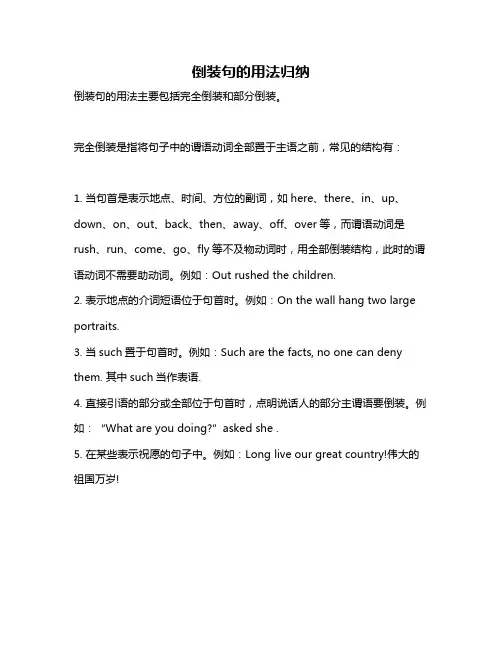
倒装句的用法归纳
倒装句的用法主要包括完全倒装和部分倒装。
完全倒装是指将句子中的谓语动词全部置于主语之前,常见的结构有:
1. 当句首是表示地点、时间、方位的副词,如here、there、in、up、down、on、out、back、then、away、off、over等,而谓语动词是rush、run、come、go、fly等不及物动词时,用全部倒装结构,此时的谓语动词不需要助动词。
例如:Out rushed the children.
2. 表示地点的介词短语位于句首时。
例如:On the wall hang two large portraits.
3. 当such置于句首时。
例如:Such are the facts, no one can deny them. 其中such当作表语.
4. 直接引语的部分或全部位于句首时,点明说话人的部分主谓语要倒装。
例如:“What are you doing?”asked she .
5. 在某些表示祝愿的句子中。
例如:Long live our great country!伟大的祖国万岁!
部分倒装是指将谓语的一部分如助动词或情态倒装至主语之前。
如果句中的谓语没有助动词或情态动词,则需添加助动词do, does或did,并将其置于主语之前。
以上信息仅供参考,如有需要,建议查阅语法书籍或咨询英语教师。
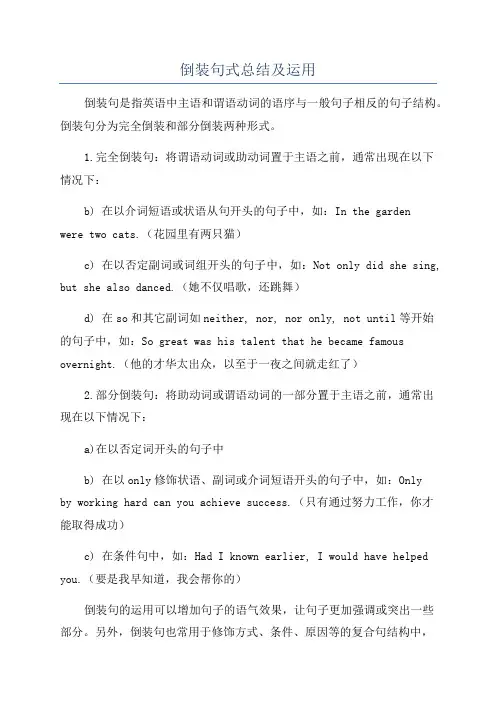
倒装句式总结及运用
倒装句是指英语中主语和谓语动词的语序与一般句子相反的句子结构。
倒装句分为完全倒装和部分倒装两种形式。
1.完全倒装句:将谓语动词或助动词置于主语之前,通常出现在以下
情况下:
b) 在以介词短语或状语从句开头的句子中,如:In the garden
were two cats.(花园里有两只猫)
c) 在以否定副词或词组开头的句子中,如:Not only did she sing, but she also danced.(她不仅唱歌,还跳舞)
d) 在so和其它副词如neither, nor, nor only, not until等开始
的句子中,如:So great was his talent that he became famous overnight.(他的才华太出众,以至于一夜之间就走红了)
2.部分倒装句:将助动词或谓语动词的一部分置于主语之前,通常出
现在以下情况下:
a)在以否定词开头的句子中
b) 在以only修饰状语、副词或介词短语开头的句子中,如:Only
by working hard can you achieve success.(只有通过努力工作,你才
能取得成功)
c) 在条件句中,如:Had I known earlier, I would have helped you.(要是我早知道,我会帮你的)
倒装句的运用可以增加句子的语气效果,让句子更加强调或突出一些
部分。
另外,倒装句也常用于修饰方式、条件、原因等的复合句结构中,
使句子更加清晰和简洁。
在日常生活和写作中,我们可以灵活运用倒装句,增加句子的变化和表达效果。
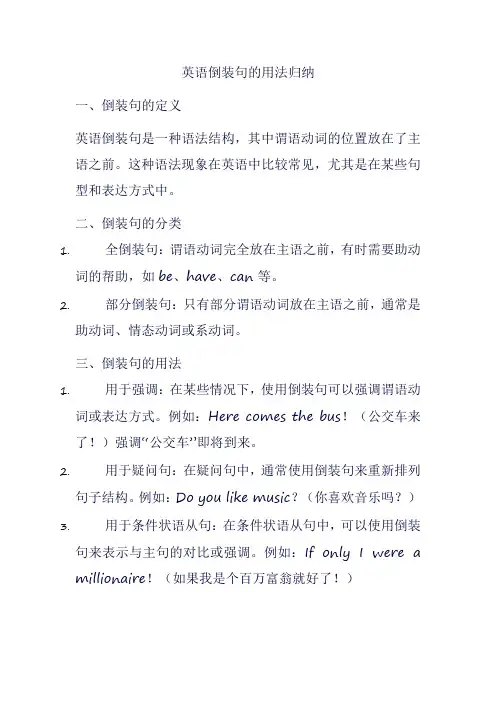
英语倒装句的用法归纳一、倒装句的定义英语倒装句是一种语法结构,其中谓语动词的位置放在了主语之前。
这种语法现象在英语中比较常见,尤其是在某些句型和表达方式中。
二、倒装句的分类1.全倒装句:谓语动词完全放在主语之前,有时需要助动词的帮助,如be、have、can等。
2.部分倒装句:只有部分谓语动词放在主语之前,通常是助动词、情态动词或系动词。
三、倒装句的用法1.用于强调:在某些情况下,使用倒装句可以强调谓语动词或表达方式。
例如:Here comes the bus!(公交车来了!)强调“公交车”即将到来。
2.用于疑问句:在疑问句中,通常使用倒装句来重新排列句子结构。
例如:Do you like music?(你喜欢音乐吗?)3.用于条件状语从句:在条件状语从句中,可以使用倒装句来表示与主句的对比或强调。
例如:If only I were a millionaire!(如果我是个百万富翁就好了!)4.用于让步状语从句:在让步状语从句中,可以使用倒装句来表示转折关系。
例如:Try to find a way to solve the problem!(试着找到解决问题的方法!)5.用于虚拟语气:在虚拟语气中,可以使用倒装句来表示与实际情况相反的情况。
例如:If I were you,I would go to the party.(如果我是你,我会去参加派对。
)6.用于某些固定句型:有些固定句型要求使用倒装句。
例如:“Hardly had she sat down when the phone rang.”(她刚坐下电话就响了。
)7.表示惊讶、感叹、讽刺等情绪时也可以使用倒装句。
例如:How could you do such a thing!(你怎么能做出这种事!)四、倒装句的用法归纳总结1.英语倒装句是一种语法结构,主要有全倒装句和部分倒装句两种类型。
2.使用倒装句可以强调谓语动词或表达方式,也可以用于疑问句、条件状语从句、让步状语从句和虚拟语气等语法结构中。
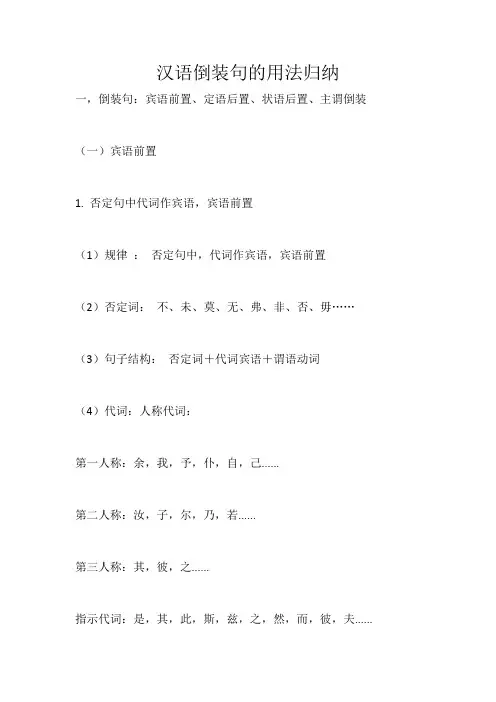
汉语倒装句的用法归纳一,倒装句:宾语前置、定语后置、状语后置、主谓倒装(一)宾语前置1. 否定句中代词作宾语,宾语前置(1)规律:否定句中,代词作宾语,宾语前置(2)否定词:不、未、莫、无、弗、非、否、毋……(3)句子结构:否定词+代词宾语+谓语动词(4)代词:人称代词:第一人称:余,我,予,仆,自,己......第二人称:汝,子,尔,乃,若......第三人称:其,彼,之......指示代词:是,其,此,斯,兹,之,然,而,彼,夫......疑问代词:谁,孰,何,曷,奚,胡,安,焉......(5)例句:v 古之人不余欺也。
→翻译:古代的人不欺骗我。
v 不学自知,不问自晓,古今行事,未之有也。
→翻译:没有这种事情。
v 不患人之不已知,患不知人也。
→翻译:不担心别人不了解自己。
三岁贯汝,莫我肯顾。
→翻译:不肯照顾我。
2. 疑问句中代词作宾语,宾语前置:(何、安、谁、奚)(1)规律:疑问句中,疑问代词作宾语,宾语前置(2)疑问代词:何、安、奚、谁、孰、曷、胡、焉……(3)句子结构:疑问代词+谓语动词(4)例句:v 大王来何操?→翻译:大王来的时候带了什么?v 沛公安在?→翻译:沛公在什么地方?v 君谁与归?→翻译:您与谁回去?3、“之”,“是”作为宾语前置句的标志(1)规律:之、是可以作为宾语前置句的标志(2)句子结构:宾语+之/是+谓语(3)例句:v 宋,何罪之有→翻译:宋国,有什么罪?v 寡君其罪之恐,敢与知鲁国之难?→翻译:我们国君正担心(自己的)罪过,哪里敢过问鲁国的困难呢?v 唯利是图→翻译:只图谋利益v 唯命是从→翻译:只听从命令4、介词“以”的宾语提前v 一言以蔽之。
→以一言蔽之。
v 秋以为期。
→以秋为期。
(二)定语后置1:“之”可以作为定语后置句的标志。
v 蚓无爪牙之利,筋骨之强→翻译:蚯蚓没有(锋利的)爪子和牙齿,(强劲的)筋骨。
2:“者”可以作为定语后置句的标志。
v 计未定,求人可使报秦者→翻译:寻求一个(可以派去回复秦国的)人。

英语倒装句归纳 Share classic historical materials英语倒装句的用法类型1)部分倒装——助动词\情态动词+主语+谓语的实义动词型2)全倒装——谓语+主语型一、在以下结构中用全倒装:这种结构通常只用于一般现在时和一般过去时..常见的结构有:1.在there be或者There livestand;appear.seem;remain;exist…. 句型中;如:There are thousands of people on the square. 原语序:Thousands of people are there on the square.There lived an old fisherman in the village. 原语序:An old fisherman lived there in the village.There stands a little girl. 正常语序:A little girl stands there.2.在“here; there; now; thus; then+动词+主语”的句子中;谓语动词为be; go;come; lie; run等;主语为名词;Now comes my turn. There goes the bell. Then came the order to leave. Here comes a bus= A bus comes here.3.在“out\ in; up\ down; off\away;in the distance;on the hill;round the corner”等表示方向性的副词或表示地点的介词词组位于句首;且主语又是名词;谓语是表示运动的动词..Away went the crowed one by one. In came a stranger in black.Out rushed the children.. Down fell the leaves. On the floor were pilesof old books.☆注意:主语必须是名词eg: Out she went.There they are. Here he comes. 而Out went the girl. Here comes the boy.4.有时为了强调表语;构成“表语+连系动词+主语”结构;Lucky is she who was chosen to be a leader.=She who was chosen to be a leader is lucky.Gone are the days when women were looked down upon =The days when women were looked down upon are gone5、在某些表示愿望的祝愿语中;全倒装..Long live the People's Republic of China May you be happy二、在以下结构中用部分倒装部分倒装是指将谓语的一部分如助动词或情态倒装至主语之前..如果句中的谓语没有助动词或情态动词;则需添加助动词do; does或did;并将其置于主语之前..1.含有否定或半否定意义的词语如:not;never;seldom;hardly;little;scarcely;barely;few…;或者含有否定结构的连词not only…but also..; neither..nor..; no sooner had…than...一......就......; scarely..than..; Hardly had ...when..; not until...;nowhere等;或否定意义的介词词组by no means决不;in no case\way任何情况下都不;with no method; at no time决不; on no account决不;under no circumstances\condition...任何情况下都不位于句首eg: I have never seen him before.=Never have I seen him before.Not a word did he say when he left. Seldom/Scarecely does he go to that park.Hardly几乎不...... do I speak to him. Little English can he speak.Little does he realize the importance of the meeting. Few people did I see in the street.含有否定结构的连词:eg:1Not only can he play basketball; but also I can.2No sooner had we arrived home than it began to rain.3Hardly had we met our friends when the train left.4Not until the baby fell asleep did the mother leave the room.主句倒装;从句不倒装=The mother didn’t leave the room until the baby fell asleep.注意:1Not only...but also...必须连接两个分句时;才使用部分倒装..而且只倒装not only后的分句..如果连接的是两个并列词语;不用倒装结构..如:Not only his father but also I like reading.2Hardly...when...; Scarcely...than...; No sooner...than...意义基本相同;它们连接的句子;都只倒装前一个分句;即:“前倒后不倒装”..3当not until直到......才引导主从复合句时;主句倒装;从句不用倒装;或者可以理解为:“后倒前不倒装”..含有否定意义的介词词组:如:By no means should we tell lies. On no account should we let him leave.At no time决不will I get married to you. In Under no circumstances will I lend money to him.注意:in no time立即;马上位于句首时;其后无需用倒装语序:In no time he worked out the problem. 他马上就算出了那道题..2.only+副词;或介词短语;或状语从句时;主句倒装;eg: Only in this way can you use the computer well. only+介词短语Only yesterday did he find out that his watch was missing.only+副词Only when it began to rain did he finish his job.only+状语从句3.so用在句首;表示另一主语“也......样”时;用“So + behave;助动词或情态动词+主语”结构;而表示另一主语“也不......样”时;用“Nor\Neither + behave;助动词或情态动词+主语”结构;注意:若是对上文同一主语的情况进行强调时;不倒装..句型为“So+主语+be或dodid/have ”..He went to school yesterday; so did I.---David has made great progress recently. --So he has; and so have you.He hasn't finished his homework; and nor have I. 特别注意:If you won't go; neither/nor will I.4.as 作“尽管/虽然”;引导让步状语从句as可以换成though;由于语法需要;需要部分倒装..Shortest as/though she is; she is not the fattest.倒装后;最高级前不用冠词Child as he is; he knows a lot.倒装后;单数名词前不用aFail as I did; I would try again.倒装后;实义动词提前;在主语后添加助动词.. Hard as he tried; he didn't pass the exam.副词提到句首注意:though位于句首引导让步状语从句时;可以倒装;也可以不倒装..但as引导让步状语从句时;必须使用倒装..否则就变成了原因状语从句..eg:As he is too young; he couldn't go to school.5.在”so…that…”和”such…that…”引导的结果状语从句中;当so和such位于句首时;用”so\such + ... +部分谓语+ 主语+...”;So difficult was the exam that most of the students failed to pass it.=The exam was so difficult that most of the students failed to pass it.6.若if 引导的虚拟条件句中有were; had; should 时; 可将if省略;把were; had ; should 放在句首..1)Should it rain tomorrow; we would not play basketball.=If it should rain tomorrow; we would not play basketball.2Had I prepared well; I couldn't have lost the job.=If I had prepared well; I couldn't have lost the job.3 Were he to come tomorrow; I would go to meet him at the airport.=If he were to come tomorrow; I would go to meet him at the airport.倒装句练习题1. Not until I began to work ____ how much time I had wasted.A. didn't I realizeB. did I realizeC. I didn't realizeD. I realized2. Only by practising a few hours every day ____ be able to master the language.A. you canB. can youC. you willD. will you3. If you don't go; neither ____.A. shall I B. do I C. I do D. I shall4. No sooner ____ to the station ____ the train left.A. had I got; whenB. I had got; thanC. had I got; thanD. didI get; when5. — Your father is very strict with you. —_____ He never lets off a single mistake of ours.A. So he isB. So is heC. He is soD. So does he6. ____ today; he would get there by Sunday.A. Would he leaveB. Was he leavingC. Were he to leaveD. If he leave7. Never in my life ____ such a thing.A. I have heard or have seenB. have I heard or seenC. I have heard or seenD. did I hear or see8. —— Here ____ Where is Xiao LiuThere ____.A. comes the bus; is heB. comes the bus; he isC. the bus comes; is heD. the bus comes; he is9. ____ ;I will not buy it.A. Much as do I like itB. As much I like itC. Much as I like itD. As I like it much10. —— I like football. I don't like volleyball. ____.A. So do IB. Neither do IC. So it is with meD. So is it with me11. _____ the expense; I _____ to Italy.A. If it were not; goB. Were it not for\would goC. Weren't it for\will goD. If it hadn't been\would have gone12. So _____ in the darkness that he didn't dare to move an inch.A. he was frightenedB. was he frightenedC. frightened he wasD. frightened was he13. -- In modem times; girls like beautiful clothes.--Yes; _____ and_____ After all; our life has greatly improved.A. so do they; so do youB. so they do; so you doC. so do they; so you doD. so they do; so do you14. —— You have an English class every day except Sunday. _____.A. So we haveB. So we doC. So have weD. So do we15. I wonder if your wife will go to the ball. If your wife _____; so_____ mine.A. does; willB. will; doesC. will; wouldD. does; do16. Only after I read the text over again _____ its main idea.A. that I knewB. did I knewC. 1 could knowD. I did know17--You seem to have learned all the English words by heart. -- _____ .A. So l doB. So do lC. So I haveD. So have I18. -- I seldom watch TV; but listen to the radio a lot. --_____ .A. So do IB. Neither do IC. I m the sameD. So it is with me19. So excited _____ that he couldn't say a word.A. he seemedB. did he seemC. was he seemingD. he did look20. Jimmy was so nervous not a single word _____ down in the dictation.A. he wroteB. he was writtenC. did he writeD. was he written21. Little ______ when 1 took the trip where it would lead me.A. have I knownB. had I knownC. do 1 knowD. did I know22. -- Have you ever seen anything like that before---- ____.A. No; I never have seen anything like that beforeB. No; never I have seen anything like that beforeC. No; never have 1 seen anything like that beforeD. No; I have seen anything like that before never23. _____ ;1 would accept the invitation and go to the party.A. Were I youB. Was I youC. Had I been youD. Would 1 be you24. You should work less _____.A. and neither should IB. and so should IC. and nor should ID. and so I should25. _____ and caught the mouse.A. Up the cat jumpedB. The cat up jumpedC. Up jumped the catD. Jumped up the cat26. Not only _____ a promise; but also he kept it.A. did he makeB. he madeC. does he makeD. has he made27. His uncle is a worker and has been working in the factory for more than ten years. _____.A. So is his auntB. So has his auntC. So his aunt doesD. Soit is with his aunt28. Not once _____ their plan.A. did they changeB. they changedC. changed theyD. they did change29. -- Do you know Jim quarreled with his brother-- I don't know; and______ .A. nor don't I careB. nor do I careC. I don't care neitherD. Idon't care also30. Not until he arrived home _____ he find that this wallet had been stolen.A. didB. wouldC. whenD. that31. --This is one of the oldest trees in the world. _____ such a big tree.A. Never I have seenB. I haven't never seenC. Never have I seenD. I have seen never32. Nowhere else in the world _____ cheaper tailoring裁缝业;成衣业thanin Hong Kong.A. a tourist can findB. can a tourist findC. a tourist will findD.a tourist has found33._____ succeed in doing anything.A. Only by working hard we canB. By only working hard we canC. Only we can by working hardD. Only by working hard can we34._____ that we all went out; lying in the sun.A. So fine was the weatherB. So was the fine weatherC. The weather was so fine wasD. So the weather was tine35. ____ a nice man ____ that we all believe him.A. So; did he seemB. So; he seemedC. Such; he seemedD. Such; did he seem36. --You seem to be an actor. --___ . I have played many parts in alot of films.A. So do IB. So am IC. So I doD. So I am37. Not only ____ working hard; but also ____ very polite.A. the boy is; he isB. is the boy; he isC. the boy is; is heD. is the boy; is he38. ____; he never seems able to do the work beautifully.A. Try as he doesB. As he triesC. Try as does heD. As try he does39.-- I cannot see the picture well from here.---- _____.A. Neither can t IB. Neither I canC. I can't neitherD.Neither can I40.--You ought to have given them some advice ---- _____; but who cared what I askedA. So ought youB. So 1 oughtC. So it wasD. So I did41. So carelessly _____ that he almost killed himself.A. he drivesB. does he driveC. did he driveD. he drove42. Little _____ about his own health though he was very ill.A. he caredB. did he careC. he caresD. does he care43. Well ____ know him and well ____ know me.A. I did; he didB. did I; he didC. did I; did heD. I did; did he44. No sooner ____ they rushed out into the street.A. did they hear the news thanB. did they hear the news whenC. had they heard the news thanD. had they heard the news when45. Little wonder _____ up their hands in dismay.A. have some thrownB. some have thrownC. thrown some haveD. have thrown some46. ____; he would have passed the exam. A. If he were to studyB. If he studied hardC. Had he studied hardD. Should he study hard47. We were lucky enough; for no sooner _____ home _____ it rained.A. we returned; andB. we had returned; whenC. did we return; whenD. had we returned; than48. So little _____ agree on the plan that they could not settle their difference.A. did theyB. do theyC. they didD. they did not49. _____ he realized it was too late to return home.A. No sooner it grew dark thanB. Hardly did it grow dark whenC. It was not until dark thatD. It was until dark that参考答案1~5 BDACA 6~10 CBBCC 11~15 BDDBA 16~20 BADBC 21~25 DCABC 26~30 ADABA 31~35 CBDAD 36~40 DBADD 41~45 CBCCB 46~49 CDAC。
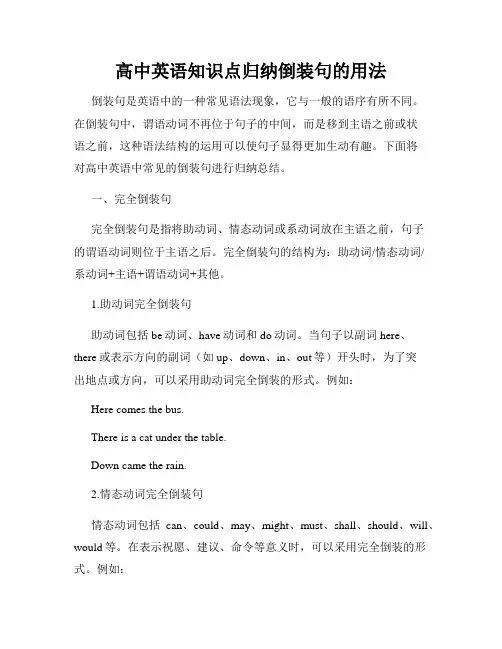
高中英语知识点归纳倒装句的用法倒装句是英语中的一种常见语法现象,它与一般的语序有所不同。
在倒装句中,谓语动词不再位于句子的中间,而是移到主语之前或状语之前,这种语法结构的运用可以使句子显得更加生动有趣。
下面将对高中英语中常见的倒装句进行归纳总结。
一、完全倒装句完全倒装句是指将助动词、情态动词或系动词放在主语之前,句子的谓语动词则位于主语之后。
完全倒装句的结构为:助动词/情态动词/系动词+主语+谓语动词+其他。
1.助动词完全倒装句助动词包括be动词、have动词和do动词。
当句子以副词here、there或表示方向的副词(如up、down、in、out等)开头时,为了突出地点或方向,可以采用助动词完全倒装的形式。
例如:Here comes the bus.There is a cat under the table.Down came the rain.2.情态动词完全倒装句情态动词包括can、could、may、might、must、shall、should、will、would等。
在表示祝愿、建议、命令等意义时,可以采用完全倒装的形式。
例如:May you have a happy birthday!Should you need any help, feel free to ask.Will you please close the door?3.系动词完全倒装句系动词包括be动词、seem、appear、look、sound等。
在表示位置、方式、状态、主语特征等方面时,可以采用系动词完全倒装的形式。
例如:On the table lies a book.How beautiful the flowers are!Tired as he was, he kept working.二、部分倒装句部分倒装句是指将谓语动词的一部分(通常是助动词或情态动词)与主语之间的位置对调,这种语法结构常见于否定句、选择疑问句和以感叹词开头的句子。
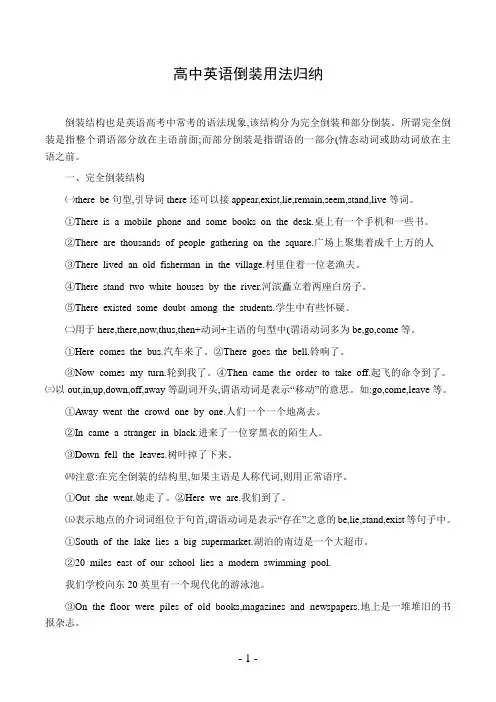
高中英语倒装用法归纳倒装结构也是英语高考中常考的语法现象,该结构分为完全倒装和部分倒装。
所谓完全倒装是指整个谓语部分放在主语前面;而部分倒装是指谓语的一部分(情态动词或助动词放在主语之前。
一、完全倒装结构㈠there be句型,引导词there还可以接appear,exist,lie,remain,seem,stand,live等词。
①There is a mobile phone and some books on the desk.桌上有一个手机和一些书。
②There are thousands of people gathering on the square.广场上聚集着成千上万的人③There lived an old fisherman in the village.村里住着一位老渔夫。
④There stand two white houses by the river.河滨矗立着两座白房子。
⑤There existed some doubt among the students.学生中有些怀疑。
㈡用于here,there,now,thus,then+动词+主语的句型中(谓语动词多为be,go,come等。
①Here comes the bus.汽车来了。
②There goes the bell.铃响了。
③Now comes my turn.轮到我了。
④Then came the order to take off.起飞的命令到了。
㈢以out,in,up,down,off,away等副词开头,谓语动词是表示“移动”的意思。
如:go,come,leave等。
①Away went the crowd one by one.人们一个一个地离去。
②In came a stranger in black.进来了一位穿黑衣的陌生人。
③Down fell the leaves.树叶掉了下来。
㈣注意:在完全倒装的结构里,如果主语是人称代词,则用正常语序。
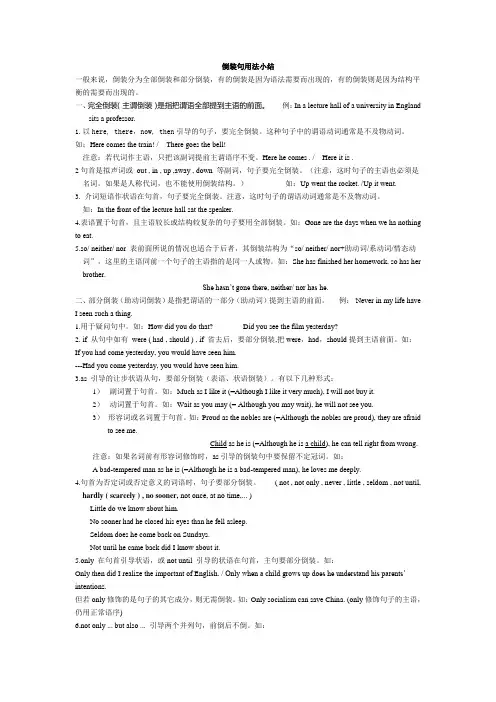
倒装句用法小结一般来说,倒装分为全部倒装和部分倒装,有的倒装是因为语法需要而出现的,有的倒装则是因为结构平衡的需要而出现的。
一、完全倒装(主谓倒装)是指把谓语全部提到主语的前面。
例:In a lecture hall of a university in Englandsits a professor.1.以here, there,now, then引导的句子,要完全倒装。
这种句子中的谓语动词通常是不及物动词。
如:Here comes the train! / There goes the bell!注意:若代词作主语,只把该副词提前主谓语序不变。
Here he comes . / Here it is .2句首是拟声词或out , in , up ,away , down 等副词,句子要完全倒装。
(注意,这时句子的主语也必须是名词。
如果是人称代词,也不能使用倒装结构。
)如:Up went the rocket. /Up it went.3. 介词短语作状语在句首,句子要完全倒装。
注意,这时句子的谓语动词通常是不及物动词。
如:In the front of the lecture hall sat the speaker.4.表语置于句首,且主语较长或结构较复杂的句子要用全部倒装。
如:Gone are the days when we ha nothing to eat.5.so/ neither/ nor 表前面所说的情况也适合于后者,其倒装结构为“so/ neither/ nor+助动词/系动词/情态动词”,这里的主语同前一个句子的主语指的是同一人或物。
如:She has finished her homework, so has her brother.She hasn’t gone there, neither/ nor has he.二、部分倒装(助动词倒装)是指把谓语的一部分(助动词)提到主语的前面。
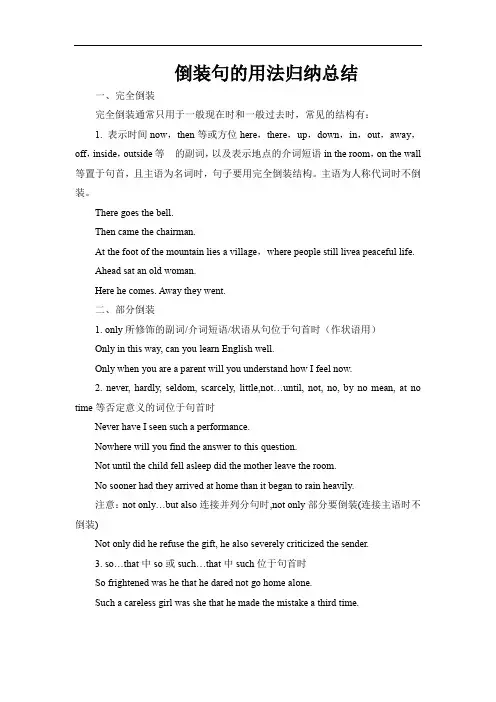
倒装句的用法归纳总结一、完全倒装完全倒装通常只用于一般现在时和一般过去时,常见的结构有:1. 表示时间now,then等或方位here,there,up,down,in,out,away,off,inside,outside等的副词,以及表示地点的介词短语in the room,on the wall 等置于句首,且主语为名词时,句子要用完全倒装结构。
主语为人称代词时不倒装。
There goes the bell.Then came the chairman.At the foot of the mountain lies a village,where people still livea peaceful life.Ahead sat an old woman.Here he comes. Away they went.二、部分倒装1. only所修饰的副词/介词短语/状语从句位于句首时(作状语用)Only in this way, can you learn English well.Only when you are a parent will you understand how I feel now.2. never, hardly, seldom, scarcely, little,not…until, not, no, by no mean, at no time等否定意义的词位于句首时Never have I seen such a performance.Nowhere will you find the answer to this question.Not until the child fell asleep did the mother leave the room.No sooner had they arrived at home than it began to rain heavily.注意:not only…but also连接并列分句时,not only部分要倒装(连接主语时不倒装)Not only did he refuse the gift, he also severely criticized the sender.3. so…that中so或such…that中such位于句首时So frightened was he that he dared not go home alone.Such a careless girl was she that he made the mistake a third time.4. so位于句首表示前句的内容也同样适用于后一个人或物时(只能是肯定句,且前后两句主语不同); neither/nor用于句首,表示前句的否定内容也适用于后一句的人/物时(只能用于否定句,且前后两句主语不同)He likes chatting. So does his wife.If you won't go, neither will I.5. 在虚拟语气中,如果if条件从句有系动词were或助动词should/had,可以把其置于句首,同时省去if.Were it to rain, we would cancel the plan.。
倒装句的用法总结
倒装句是英语语法中一种常见的句式结构,用于强调句子的其中一部分或在特定情况下使用。
以下是关于倒装句的用法总结:
1. 将助动词置于主语之前的倒装句:在一般疑问句中,助动词被置于主语之前,例如:"Do you like chocolate?"(你喜欢巧克力吗?)在以否定形式构成的句子中,助动词和表示否定的词一起置于主语之前,例如:"She does not want to go."(她不想去。
)
2. 在以副词或介词短语开头的句子中的倒装句:在以副词或介词短语开头的句子中,主语和谓语动词发生倒装,例如:"Seldom do I go to parties."(我很少去参加派对。
)另一个例子是:"Under the table lies a hidden treasure."(桌子下面藏着一份隐藏的宝藏。
)
3. 在强调句中使用倒装句:为了强调句子中的其中一部分,可以使用倒装句,例如:"It was John who broke the vase."(是约翰打破了花瓶。
4. 在以否定副词或短语开头的句子中的倒装句:当句子以否定副词或短语开头时,主语和谓语动词发生倒装,例如:"Never have I seen such a beautiful sunset."(我从未见过如此美丽的日落。
)需要注意的是,虽然倒装句在英语中常见,但并不是所有情况下都需要使用倒装句。
因此,在使用倒装句时,需要根据具体语境和句子结构来决定是否使用。
倒装句用法总结完全倒装:There be/v 句型There is something somewhere.There+ v. + something/somebody.典型例句:There is a box on the table.There goes the bell.There she comes.(*如果主语是人称代词--I, you, he, she,主语和主要动词的词序不变)为了表达生动,有时把表地点、方位的副词,如up,down,out,away,in等放在句首,同时把谓语动词放在主语之前。
Adv.+动词+主语典型例句:Away hurried the boy.Out rushed the girl.In she came.部分倒装:在以never,little,hardly,not only,few,not,seldom 等否定副词开头的句子中,采用部分倒装。
否定副词(never 等)+助动词/情态动词+……典型例句:Little did he say at the meeting.Never shall I forget the day when I joined the Army.I shall never forget the day when I joined the Army.(*如不放在句首就不要倒装。
)用于以only所修饰的副词、介词短语或状语从句的句子中。
Only+状语+be动词/情态动词/助动词+……典型例句:Only when the war was over in 1918 was he able to get happily back to work.Only in this way can we learn English well.Only Mary knows this.(*如果only后面的词组不是状语,则不需要倒装。
)So + 形容词、副词及such 置于句首时要部分倒装。
完全倒装&部分倒装一、完全倒装( 5items )1. 表示动作趋向的副词置于句首时且主语是名词,动词是表示运动或存现:Here/ There ;In / Out; Up/Down; Away + be/come/go/ rush/run + 主语Eg. Here comes the bus. There goes the bell.Up flew the balloon. Down fell the apples from the tree.Away went the angry manager. IncameMr. Wang.2. 时间副词 Now/ Then 置于句首,主语是名词,动词是趋向或存现动词go/come/be/rush/run 等Eg. Now comes your turn. Then starts another programme.3.地点介词作状语放在句首,主语是名词,动词表存现On top the mountain stands an old tree.At the foot of the hill lies a village.In front of the village runs a stream.4 .代词前置Such was Einstein, a great and cute man .5.表语前置(现在分词、过去分词、形容词)时实行完全倒装Walking beside me were some visitors from abroad.Gone are the days when the Chinese were looked down upon by foreigners. Attached to the meeting was a card.Present at the meeting were some leaders of the town.二、部分倒装( 10items )1. 否定词或半否定词置于句首,部分倒装Never/ Hardly/Seldom/ Little/Nowhere/ By no means … +助+主语Little does she care about what she looks.By no means will I forgive you.2. Not only+助+主谓 but also +主谓,前倒后不倒Not only had he sold out his house but he also sold his baby for drugs.3. Not until+主谓+助主谓,前不倒后倒Not until I began to work did I know how much I needed to learn.另外注意 It is not until …that…句型4. So /Neither/Nor 放在句首用部分倒装---He loves football. ---So do I.---He never swims. ----Neither/Nor does his girlfriend.5. Hardly/ No sooner had sb done when/ than sb did sth.Hardly had they arrived when it began to rain.6. So …that …/ Such …that 前倒后不倒So happy were the audiences that they laughed again and again. Such good weather is it that we feel like going outing.7. as/though 引导的让步状语从句( 4items )Child as he is, he manages to make a living by working in a factory.Strange as his idea might sound, it was a accepted at last.Hard as I tried, I couldn ’tpersuade her.Try as he might, he couldn ’t pass the exam.8. Only+状语(从句)置于句首,主句用倒装Only in this way can you improve your English.Only whenI became a mother myself did I know how tired my mother oncewas.9. 省略 if 的虚拟条件句中,将助动词 had/should/were 等提前,如果这些助动词跟有否定词 not, not 不提前If it hadn’t been for your timely help, I would still be in trouble now.= Had it not been for your timely help, I would still be in trouble now.10. 祝愿May you be happy !。
倒装句用法知识点总结倒装句是英语语法中的一种特殊句型,通过改变主谓语序,使得句子结构更加灵活且具有强调的效果。
在英语中,倒装句常见于疑问句、条件句、以及某些特定情况下。
本文将对倒装句的用法进行总结和归纳。
一、全倒装句全倒装句是指将助动词或情态动词放在主语之前,与否定词或者表示否定意义的副词连用。
全倒装句的结构如下:1. 在一般疑问句中,将助动词放在主语之前。
例如:- Do you like apples? (你喜欢苹果吗?)- Can he swim? (他会游泳吗?)2. 在以疑问代词引导的特殊疑问句中,将助动词放在主语之前。
例如:- What did you eat for breakfast? (你早餐吃了什么?)- Where can we find the nearest restroom? (我们可以在哪里找到最近的洗手间?)3. 在以否定词或表示否定意义的副词开头的句子中,将助动词放在主语之前。
例如:- Never have I seen such a beautiful sunset. (我从未见过如此美丽的日落。
)- Not only did she study hard, but she also achieved excellent results. (她不仅学习刻苦,而且取得了优异的成绩。
)二、部分倒装句部分倒装句是指将助动词、情态动词、或者动词本身的某种形式放在句首,与主语之间倒装。
部分倒装句的结构如下:1. 在以否定副词开头的句子中,将助动词或情态动词放在句首。
例如:- Rarely do I go to bed before midnight. (我很少在午夜前睡觉。
)- Seldom has he been to the countryside. (他很少去过农村。
)2. 在以表示“否定”“否认”“无法”等意义的副词开头的句子中,将情态动词、助动词或谓语动词的某种形式放在句首。
倒装句的四种情况与用法总结倒装句是英语语法中的一种特殊结构,其谓语动词与主语的位置颠倒。
它的运用可以增添句子的丰富性和多样性,使文章表达更加精确和简洁。
本文将介绍倒装句的四种常见情况与用法。
一、完全倒装句完全倒装句的结构是:助动词/情态动词+主语+谓语动词。
这种倒装句常用于以下情况:1.以表示地点或方向的副词开头例如:Up the hill ran the little boy.Down the road came a black cat.2.以表示频率或程度的副词开头例如:Rarely have I seen such a beautiful sunset.So loudly did he speak that everyone turned to look.3.以表示否定意义的副词开头例如:Never have I heard such a bizarre story.Not until then did I realize the severity of the situation.二、部分倒装句部分倒装句是指将助动词/情态动词提前至句首,主语和谓语动词的位置保持不变。
这种倒装句常用于以下情况:1.以表示反义意义的副词开头例如:Hardly had he arrived home when the phone rang.Barely had she finished her speech when the audience applauded.2.以表示条件的状语从句开头例如:Should you need any assistance, please do not hesitate to contact me.Had it not been for your help, I would have failed the exam.三、拓展倒装句拓展倒装句是将某些表语、状语或其他成分提前至句首,与谓语动词形成倒装结构。
1. 否定副词位于句首时的倒装2. 在正式文体中,longer, nowhere 等含有否定意义副词若位于句首,则其后要用部分装:3. I shall never forgive him. / Never shall I forgive him. 我永远不会宽恕他。
4. He seldom goes out for dinner. / Seldom does he go out for dinner. 他很少出去吃饭。
5. She hardly has time to listen to music. / Hardly does she have time to listen to music. 她几乎没时间听音乐。
6. He little realizes how important this meeting is. / Little does he realize how important this meeting is. 他不甚明白这个会议的重要性。
7. We had no sooner reached the airport than the plane took off. / No sooner had we reached the airport than the plane took off. 我们刚到机场,飞机就起飞了。
8. 【注意】9. (1) 对于 not…until 句型,当 not until…位于句首时,其后的主句要用倒装语序:10. He didn’t leave the room until the rain stopped. / Not until the rainstopped did he leave the room. 雨停了之后他才离开这房间。
11. (2) 某些起副词作用的介词短语,由于含有否定词,若位于句首,其后要用部分倒装:12. On no accounts must this switch be touched. 这个开关是绝不能触摸的。
倒装用法归纳
1完全倒装
完全倒装是把谓语动词完全置于主语前,其中主语必须是名词,若为代词则不倒装,这种结构中谓语部分无助动词(be,do,have)和情态动词,但可以有连系动
词be。
须用完全倒装的情况有:
1.当句首为副词out,in,up,down,off,here,there等,且主语为名词时,应用完全倒装。
如:
In came the doctor. 医生进来了。
2.当表示地点的介词短语位于句首,且主语为名词时,应用完全倒装。
如:
Under the tree were some children. 树下有一些孩子。
3.在there be结构中,there为引导词,be动词之后为句子的主语,属完全倒装,be应与主语保持一致。
除be以外,能与there连用的动词还有seem,exist,happen,appear,live,stand等。
如:
Once there lived a king who was cruel to his people.
从前有一位对人民很残暴的国王。
4.作表语的形容词、过去分词等较短,而主语相对比较长,为了保持句子平衡
而将表语前置时,句子的主谓也应完全倒装。
如:
Typical for China is the crosstalk show, in which two comedians entertain the audiences with words.
中国典型的艺术形式是相声,两名演员用言语来逗乐观众。
5.某些表示祝愿的句子也可用完全倒装(或部分倒装)。
如:
May you succeed! 祝你成功!
2部分倒装
部分倒装则是将助动词调到主语前,主语可以是名词也可以是代词。
通常应使用部分倒装的情况有:
1.当句首为否定或半否定词never,neither,nor,little,seldom,hardly,scarcely,in no way,few,not,no等时,应用部分倒装。
如:
Never have I heard of that place before. 我以前从未听说过那个地方。
2. only修饰时间、地点、方式、原因等状语时,应用部分倒装。
如:
Only in this way can we solve the problem. 只有这样,我们才能解决这个问题。
注意:如果only修饰的不是状语,则句子不倒装。
如:
Only Uncle Li knows how it happened. 只有李叔叔知道这件事是怎么发生的。
3.表示对前者的陈述也适用后者时,肯定倒装用“so+助动词/情态动词+后者”,否定倒装用“neither/nor+助动词/情态动词+后者”。
如:
If she doesn’t go there tomorrow, neither/nor will I.
如果她明天不去那儿,我也不去。
注意:“so+助动词/情态动词+主语”与“so+主语+助动词/情态动词”的区别:前者表示所说的主语和前面主语的情况一样,所谈到的是两个人或物,意为“……也是这样”;后者所谈为同一人或物,说话者表示同意前者的观点,意为“的确如此”。
如:
— Li Lei likes sports. 李雷喜欢运动。
— So he does and so do I. 他的确喜欢,我也是的。
4. so及“so+形容词/副词”置于句首时,应用部分倒装。
如:
So quietly did she speak that we could not hear a word.
她说话声音这么低,以至我们一个字也没听到。
5. such及“such+形容词+名词”置于句首时,应用部分倒装。
如:
Such good players are they that they often win.
他们是好队员,所以他们经常获胜。
引起的并列句,若将not only置于句首时,该分句应6.由not only …but also…
部分倒装,but also引导的分句不倒装。
如:
Not only did he give me some advice, but also he lent me some money.
他不但给我提了建议,而且还借给了我一些钱。
7.由连接词no sooner…than,scarcely…when,hardly…when引起的主从复合句,主句应倒装,从句不倒装。
如:
Hardly had I got into the classroom when it began to rain.
我刚一进教室天就下起雨来。
8.由not until引导的时间状语从句位于句首时,主句应部分倒装,从句语序不
变。
如:
Not until Father came back did we begin to have supper last night.
昨晚直到父亲回来,我们才开始吃晚饭。
9.省略if的虚拟条件句,可将were,had,should提至主语前。
如:
Were I you, I would go there tomorrow. 要是我是你,我明天就会去那儿。
10.表示时间频率且有肯定意义的词语often,every day,now and again等置于句首用来强调时,应用部分倒装。
如:
Often does he send me e-mails to greet me.
他经常给我发电子信件问候我。
3主谓不倒装的倒装句
1. as/though引起让步状语从句,可将表语或状语置于句首,但主谓不颠倒顺序。
如:Tired as/though he is, he is still working. 尽管他很累,他还是在工作。
2. however,no matter how修饰形容词或副词时要前置,用以加强语气,该让
步状语从句的主谓不倒装。
如:
However hard the problem is, I am determined to work it out.
不管这道题有多难,我也决心将它算出来。